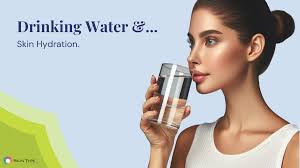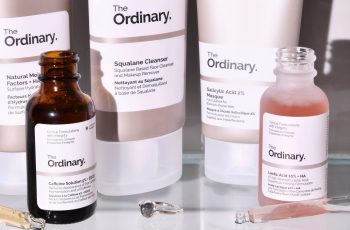
How Drinking Water Effects Skin Hydration
How much water should you drink to hydrate your skin? As a dermatologist, I am always interested in debated topics in skin care and this is a trending topic on Tik Tok right now. So-today, we’re diving into the fascinating world of skin hydration and the role that drinking water plays, if any, in moisturizing the skin. This topic has sparked considerable debate, with opinions ranging from how much water to drink to help dry skin, comments that drinking water does not hydrate skin, beliefs in water’s magical properties to skepticism about its direct effects on skin health. My goal is to shed light on this topic, guided by the idea that the state of your skin barrier (Oily Skin Type or Dry Skin Type) significantly influences how water intake affects skin hydration.
Before we get started, understanding how the content in this blog applies to you will be much easier if you know which of the 16 Baumann Skin Types you are. Take or free 3 minutes quiz to find out if you have an impaired skin barrier and are a dry skin type.
Does Drinking Water Hydrate Skin?
There is evidence that drinking adequate amounts of water can positively impact skin hydration if:
Your skin barrier is intact or you are wearing an occlusive moisturizer
You consume low amounts of water
However, if you have dry skin, your skin barrier is impaired, and you are not currently using an occlusive moisturizer or plastic wrap on your skin, then water can evaporate off the skin in a process called trans-epidermal water loss. It is impossible to hydrate skin by drinking water if water is evaporating off the skin at a rapid rate.
Research studies on drinking water and skin hydration
The studies noted in the references below suggest that increasing fluid intake may improve skin hydration, particularly in the stratum corneum, the outermost layer of the skin. This effect appears to be more pronounced in individuals who typically consume lower amounts of water.
It is hypothesized that increased water intake may lead to a higher water content in the dermis, which can then be supplied to the epidermis. Aquaporins are a water channel that allows water to move from cell to cell. It is possible that these Aquaporin channels help get water from the blood stream to the epidermis, but I did not find any studies on this.
The water content in the upper layers of the epidermis (stratum corneum) is also influenced by other factors such as:
aquaporin channel function
natural moisturizing factors (NMF) inside the cell
the structure and size of corneocytes
the composition and ratio of intercellular lipids such as ceramides, fatty acids and cholesterol that form the skin barrier.
which fatty acids make up the skin barrier
temperature
climate
circadian rhythm
blood flow
presence of histamine
You can see that their are many factors to cloud the issue, which is why there are many opinions on the subject. My opinion as a dermatologist is: drink water and use the best skincare routine for your Baumann Skin Type to keep your skin hydrated.
The skin barrier and skin hydration
Your skin’s barrier is your first line of defense against environmental threats and plays a pivotal role in hydration. This layer is composed of lipids, including ceramides, cholesterol, and free fatty acids, which are critical for maintaining its integrity and function. These lipids create a protective matrix that keeps water on the skin and guards against external irritants.
In oily skin types, this lipid barrier is well-structured and effective, keeping moisture locked in and ensuring the skin remains hydrated and resilient. However, when the barrier is damaged in any way, due to factors like harsh skincare products, environmental stressors, or genetic predispositions, the lipid composition can become unbalanced. That’s why barrier repair moisturizers are so important.
What is most important to understand is that a damaged skin barrier will not keep the skin hydrated, but a healthy skin barrier will absolutely hold moisture on the face.
Oily skin types have a healthy barrier, while dry skin types have an impaired skin barrier.
Water and Skin Hydration
It is well known that drinking water is paramount to the hydration of your skin and body. They’ve also discovered that the type of water you drink matters. You can check out our whole blog on different types of water in skin care here!
But it’s not just about drinking water. You can also help your skin by using moisturizers that repair your skin barrier and eating foods that are skin-friendly. If you have dry skin or conditions like eczema, combining drinking more water with the right barrier repair moisturizers can be a game-changer.
Dry vs Oily skin types
I’ve mentioned the difference between oily and dry skin types above, but here’s a little more detail. The Baumann Skin Typing system classifies skin into 16 distinct types, including Dry (D) and Oily (O) categories based on the skin barrier’s condition and sebum production.
Dry (D) Types : In dry skin types, the lipid barrier is often impaired, leading to increased moisture loss and susceptibility to dryness and irritation. The lack of adequate lipids disrupts the barrier’s protective function, emphasizing the need for targeted hydration and barrier-repair strategies.
Oily (O) Types : Oily skin types, on the other hand, typically have a more robust lipid barrier with increased sebum production. This natural oiliness helps retain moisture and protect against water loss, resulting in naturally more hydrated skin.
Keeping your skin hydrated
Here are some practical tips for maintaining hydrated, healthy skin across different skin types:
Drink Water: Aim for sufficient water intake daily to support overall hydration, including that of the skin.
Use Barrier-Repairing Moisturizers: Look for products rich in ceramides, cholesterol (or beta-sitosterol), and fatty acids to help repair and reinforce the skin barrier.
Eat a Balanced Diet: Foods high in omega-3 fatty acids and antioxidants can support skin health and barrier function.
Protect Your Skin : Minimize exposure to harsh environmental conditions and chemical irritants that can damage the skin barrier.
Understand Your Skin Type : Knowing your skin type can guide you in choosing the most effective hydration and care strategies.
Conclusion
Drinking water plays a crucial role in skin hydration, particularly when you already have a healthy skin barrier that can hold in water. By understanding the composition of the skin barrier and how it can be impacted by various factors, individuals can adopt a holistic approach to skin care that includes adequate hydration, proper nutrition, and the use of barrier-supporting products. Regardless of your skin type, embracing these practices can lead to healthier, more hydrated skin.
Make sure to take the Baumann Skin Type Quiz to only get the best products for your skin type!


